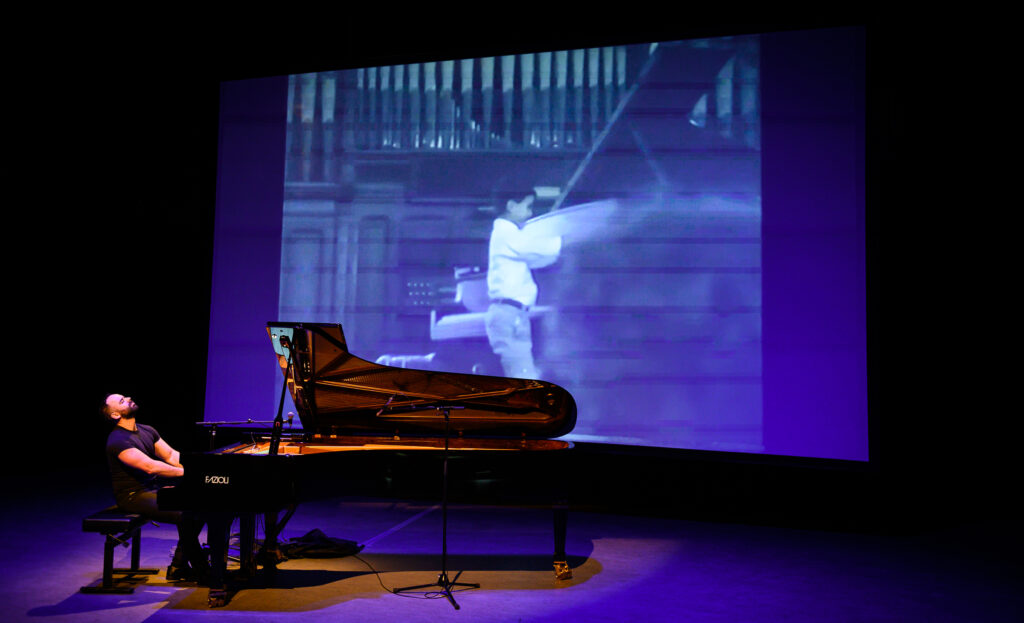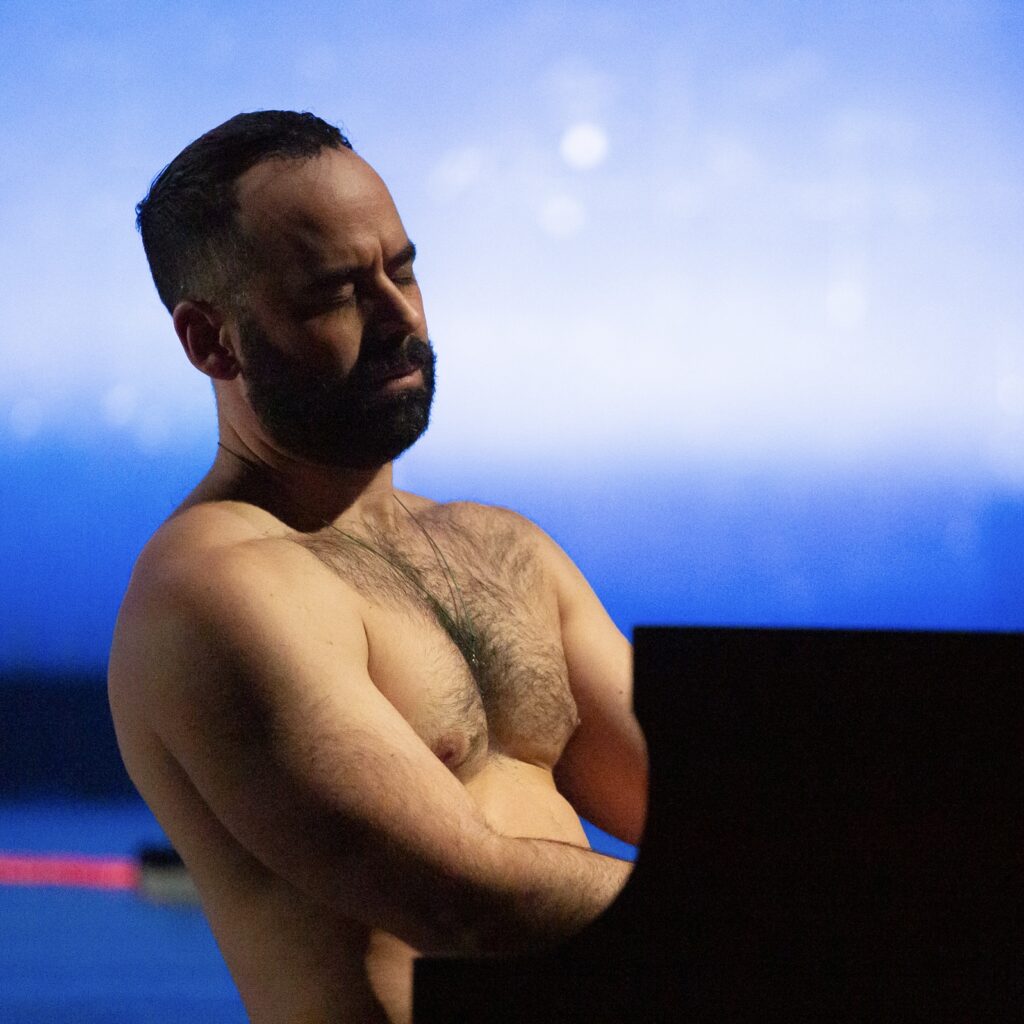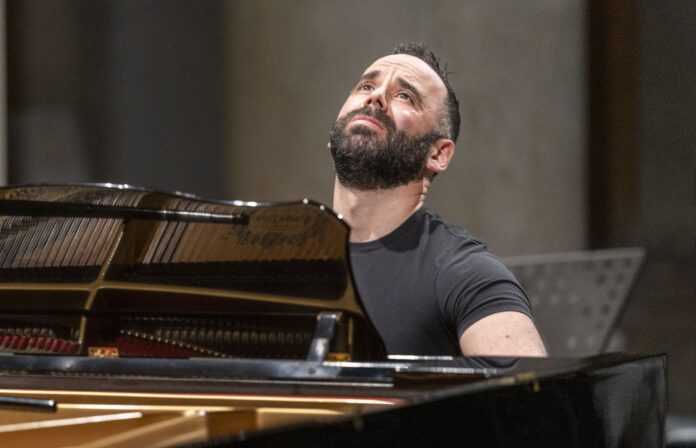Adam Tendler is one of the country’s premiere contemporary music pianists, yes, but he’s also an incredible storyteller, fabulous company at parties, and utterly unencumbered by any reticence toward being as queer as he wants to be onstage. When he sent me a folder of publicity shots for this interview full of hunky shirtless poses as he tickles the ivories and prepares the strings, the only question that crossed my mind was, “Honey, aren’t you chilly?”
Another admirable quality of Tendler’s: candidness. In a New York Times op-ed piece that tells the story of his ambitious, multimedia Inheritances project (Wed/17, Brava Theater Center, SF.), he talks about his father in terms few encounter but many are deeply familiar with:
“At the time of his death, we saw each other in person maybe once a year, during the holidays, and talked three times over the phone—his birthday, my birthday, Father’s Day—though there had been times in recent years when I didn’t know his phone number or email address. Both changed unpredictably. Still, our interactions were always warm, if brief. We weren’t estranged but seemed to lack the impulse to stay in touch; I often wondered if that was the one thing we had in common. I found it comforting.”
After his father passed, his stepmother informed him that he had been left an envelope wadded with cash. While it was barely enough to cover a couple months of living in New York, it spurred an artistic undertaking.
“Would that be my father’s legacy?” Tendler wrote. “A few weeks later, I attended a show at Roulette in Brooklyn. While I was sitting alone in the balcony, my usual perch, something happened. The music just hit me. I know that sounds corny, but it’s true. I thought to myself, This is why I’m alive. Music. Alive. It was an epiphany. The ideas collided and a whole project manifested in an instant: I would use my inheritance to commission a program of new piano works about inheritance itself.”
Inheritances was the result of Tendler reaching out to friends, telling them about his relationship to his father, and asking them to create something that was “more a favor than a commission… I trust your instincts [to take] the piece in any direction you choose.”
Of course this wasn’t just any group of friends, but a bevy of well-known cutting-edge composers including Nico Muhly, Missy Mazzoli, Ted Hearne, Christopher Cerrone, and San Francisco’s own Pamela Z. Later, the project grew to include Laurie Anderson, Devonté Hynes, Angélica Negrón, and even more. The compositions range across the spectrum from Mazzoli’s grinding “Forgiveness Machine” to Hynes’ stillness-invoking “Morning Piece.”

“A vessel for my grief” is how Tendler describes Inheritances. The sheer variety of musical and emotional terrain that the compositions cover, however, lifts Inheritances from the specificities of Tendler’s biography into the universal and, as Tendler says below in our email interview as he prepared to bring the project to San Francisco, affirms the life-giving power of community and artistic exchange.
48 HILLS Your description of your relationship to your father—comforting in its distance, lacking the impulse to stay in touch—really resonated, I think, with many people. This project, a web of interconnections, seems almost the opposite of that perfect sentiment. How did reaching out to so many people relate to the loss you felt when your father passed? Giving the money away certainly seems like one form of release.
ADAM TENDLER I think conventional wisdom often paints relationships in binary terms. You’re “close” or “estranged.” It’s “healthy” or “toxic.” But I think this program explores the blurriness and distance of even our most intimate relationships, and the shock that can occur in the wake of a loss, which is perhaps why so many people have responded so powerfully to Inheritances. Grief itself is often seen as this monolithic thing with steps and levels to unlock, but after my dad died, not only did I not really know if I’d experienced “grief,” but I didn’t feel like I had the tools or vessel to activate it or really process the loss. When I learned that he’d left me that weird wad of cash, I thought I could use it to sort of create that vessel doing the one thing I really know how to do, which is music.
Reaching out to composers, telling the story, and actually putting the process of Inheritances into motion did, I think, start the process of interrogating and reconciling that relationship. If it had drifted away, sort of like a boat does, then this project was like a rope, with me slowly pulling that boat back to shore. Giving the money away felt freeing in a sense, but also scary. There was no turning back. A vacation might have been fun and a much easier use of the money, but this felt like planting a seed and actually honoring the gesture of the inheritance so I could live with it and his memory in a meaningful way. I wasn’t really about honoring him or making a program about him, but rather about building something of worth and use out of the gesture itself.
48 HILLS The compositions come from an incredibly eclectic group of composers, and range from the very turbulent to the very still. What are two examples of pieces that were submitted that surprised you the most?
ADAM TENDLER One of the composers in the program, Timo Andres, once said in a group chat that he sensed the Inheritances composers felt they could “fly their freak flag” with this assignment. I agreed, and think it’s because they trusted me, knew my work, and also knew that the trust was mutual. I gave no “style guide,” no prompt. I just explained what had happened and asked for a piece. The result was that each composer stretched their language in totally unique and surprising ways, and delivered startlingly personal works.
Ted Hearne’s piece, simply titled “Inheritance,” comes to mind. His instrumental music can be super dense, complex, overwhelming, ecstatic, and dissonant… so I was sort of bracing for his piece to arrive, and was frankly a little worried that I wouldn’t ever have enough time to learn it. What he delivered was complex and involved, to be sure, but almost totally still and nearly inaudible. He uses the word “underwater.” It’s lilting, hypnotic, and most of the sound comes from ghostly piano resonances. I’ve never heard anything like it from him, and I think he even surprised himself with the piece.
Another work that immediately comes to mind is Marcos Balter’s “False Memories.” I associate Marcos’s music with either the sort of conceptualism of a graphic score, or the hard-edged, driving moto perpetuo virtuosity of a toccata. And of course his music lives in a million places between those worlds, harmonically and texturally. But “False Memories” is a total outlier, a sort of drunken lounge-pianist fever-dream. Marcos admits in his program notes that the piece is not at all in his regular idiom, which to me is an understatement, and also a creative risk, when composers these days are often trying to carve out a unique and distinctive voice in the “market.”
But indeed if someone heard only this piece of Marcos’s, they may think he’s a “jazz composer.” And if someone only heard me play that piece, they might think I’m a “jazz pianist.” And I love that! In the context of the whole program, there’s truly nothing like it. It’s like this hazy, surreal, jazzy interruption. And it’s certainly not at all what I expected. But I could make a case like this for literally every piece on the program.

48 HILLS Slipping into some antiquated Harold Bloom-speak here: Composers and artists notoriously live under, and fight to break free of, “father figure”-type influences. As you’ve performed the pieces this past year, have any sparked different reflections on your relationship with either your father or your own musical influences as a performer?
ADAM TENDLER This is going to sound weird and kind of salacious, but I’m attracted to father figures. And it’s weird in my own maturing to hear that term flung at me, too! “Dad,” “son,” it’s all charged language in the queer male community, and can get sort of infused into our gay bloodstream and identities from very early on. I think the idea of a “father figure” has kind of—not haunted, but hovered over me my whole life.
Part of the reason might be the capricious way my father appeared and disappeared throughout my life, especially my childhood, creating what Jüng might’ve dubbed “father hunger.” Maybe another part might be the introduction of a stepfather into my life when I was 10, who assumed pretty much all of the conventional fatherly roles expected of a dad, but who was also clearly weighing the reality of having a gay stepson. He was a hard-edged construction worker, I should add. So the existential question of a father, and what that even means, has sort of been woven into my life creatively and beyond, for a long time.
I think that my experience with Inheritances has helped humanize my dad and puncture the narrative I had shaped about him—that he was absent, that he was radicalized, that he was eccentric, that he was aloof or selfish or an addict or this or that. The more I lived with this music, the more I talked about him, and the more I dove into my archive of actual pictures and video of him—of which there are very little, I should say — the more empathy I had, the more ‘mistaken’ about him I felt I may have been, and frankly, the more fused to him I felt.
Until Inheritances, I honestly rarely thought about my dad. Since diving into this project, I think about him every day, and in a way live with his memory in a much more fleshed-out, fair, and compassionate form. I finally feel like “my father’s son,” maybe for the first time.
48 HILLS Finally, this has seemed like such a heavy subject so far, but some of the compositions I’ve read about in “Inheritances” seem to also take into account the joy and life we inherit from our elders, yes?
ADAM TENDLER Oh my gosh, yes! It’s not really a morose program. It’s intense, sure, but I find the experience of sharing it with people completely life-affirming and inspiring. And I think people leave the concert feeling lighter and more released than they did coming in. Not weighed down by, you know, grief or regret or whatever baggage might haunt us or accumulate in our lives and histories. Inheritances is sort of designed to pop all of that stuff and let the mess run through the aisles. It’s kind of awesome. People tend to stay in their seats after the performance and just, like… talk.
And there are definitely also playful pieces in the program. Some even elicit chuckles from the audience—I’m thinking of Laurie Anderson’s “Remember, I Created You” (which uses text from an artificial intelligence program she developed) or Angélica Negrón’s “You Were My Age,” or Pamela Z’s “Thank You So Much.” These are very serious works with some serious and subversive underbellies, but they are also just plain cool. And that’s sort of this recital in a nutshell, and what I’m most proud of. It’s powerful and cathartic, and people take from it whatever they want or need, but at the end of the day, it’s also just plain cool.
INHERITANCES presented by Other Minds, Wed/17, 7:30pm-9:30pm, Brava Theatre Center, SF. Tickets and more info here.







